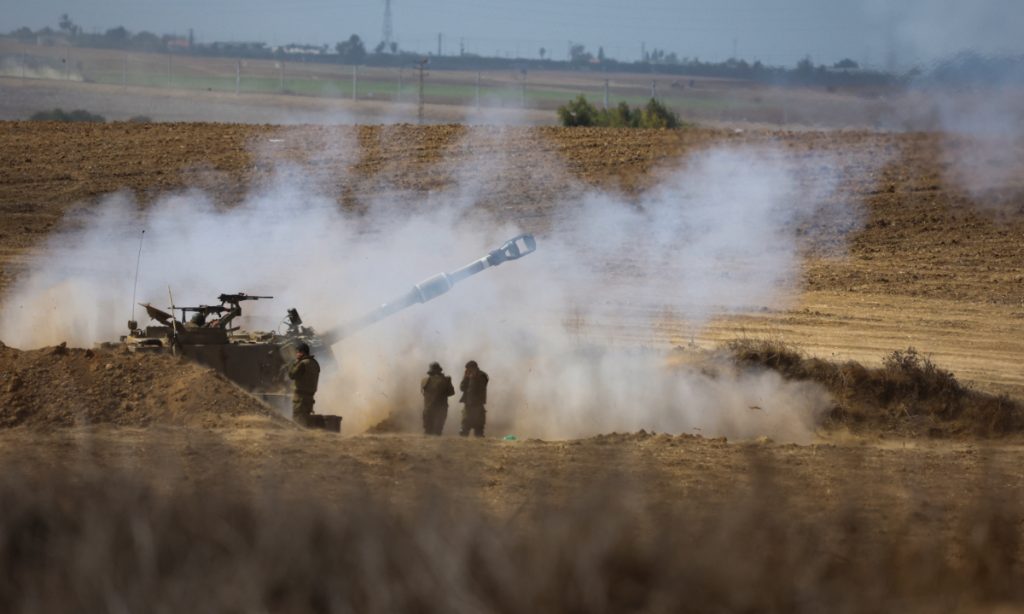Chinese special envoy to visit Middle East as Israel-Hamas violence worsens

China's special envoy on the Middle East issue will visit the relevant countries in the region in the near future, Chinese Foreign Minister Wang Yi said on Friday, as the Israel-Hamas conflict has shown no signs of easing and chaos, panic and confusion filled the region under an Israeli barrage of airstrikes ahead of a ground invasion.
Wang's comments were made while answering questions on the sidelines of the 12th EU-China Strategic Dialogue with EU foreign policy chief Josep Borrell. China's top diplomat said that in view of the current grave situation in the Israeli-Palestinian conflict, China believes it is imperative that a ceasefire be put in place as soon as possible.
China will provide urgent humanitarian assistance to the Gaza Strip and the Palestinian National Authority through UN channels, Wang said. He noted that the root cause of the conflict lies in the historical injustice suffered by the Palestinian people, which has not been rectified. China believes that only when the "two-state solution" is fully realized will there be real peace in the Middle East.
Israel says it has attacked 750 military targets overnight in the densely populated Gaza Strip, Al Jazeera reported Friday. As of press time, at least 1,537 Palestinians have been killed and 6,612 wounded in Israeli air attacks on Gaza. The number of people killed in Israel has reached 1,300.
Chinese Foreign Ministry spokesperson Wang Wenbin said on Friday that China will "make the utmost effort" to prevent the conflict from further escalating and to avoid a severe humanitarian crisis.
In recent days, China's special envoy on the Middle East issue Zhai Jun held a series of phone calls with the foreign ministers of Palestine, Israel, Egypt, Saudi Arabia, and other Middle Eastern countries to discuss the current situation, stressing that the fundamental solution to the Israeli-Palestinian conflict lies in implementing the two-state solution.
As international aid groups warned of a worsening humanitarian crisis, the US has given "a powerful green light" to Israel to march ahead with its retaliation against Hamas with the arrival of Secretary of State Antony Blinken on Thursday along with shipments of US weapons.
Chinese experts believe that the US does have the capability to mediate and prevent further escalation in the Middle East, but lacks the motivation and will to do so.
"Peace or conflict in the Middle East doesn't really affect the US because the region's strategic importance has been decreasing in recent years, partly due to reduced American dependence on Middle Eastern oil and gas resources," Zhu Yongbiao, director of the Center for Afghanistan Studies at Lanzhou University, told the Global Times on Friday. What the US really cares about is whether Israel will lose influence over the Arab world, which could indirectly affect its control over the whole region, Zhu said.
In that sense, the peace that the US wishes to see is a conditional one that caters to its own strategic interests, and it will go to great lengths to ensure that, rather than genuinely caring about the suffering of people in the region, observers noted.
A subtle change has been observed in the attitudes toward the conflict in the Western world. The EU's top diplomat Josep Borrell said Tuesday that Israel's actions in Gaza may have already breached international law, as he underlined the need for the EU to continue funding the Palestinian Authority.
Hamas' surprise attack on Israel has been widely labeled as a "9/11 moment" and the darkest moment for the Israeli people in decades. Kenneth Roth, former executive director of Human Rights Watch, however, believed that the analogy carries a cautionary note, because if the Israeli government responds to this moment like the US did, it will soon follow the same route from global sympathy to global outrage, The Guardian reported.
If Israel insists on launching a large-scale ground assault in Gaza or even attempts to exert military control over the region, the conflict may be further prolonged and intensified, Zhu warned. With the US and UK adding fuel to the fire, the exacerbating tensions may force some Islamic countries to respond, making the situation even more complex and difficult to control, and providing opportunities for other forces to take advantage of the social unrest.
Iranian Minister of Foreign Affairs Hossein Amirabdollahian has already said that if Israel's bombardment of Gaza continues, the war may open on "other fronts," AP reported Friday.